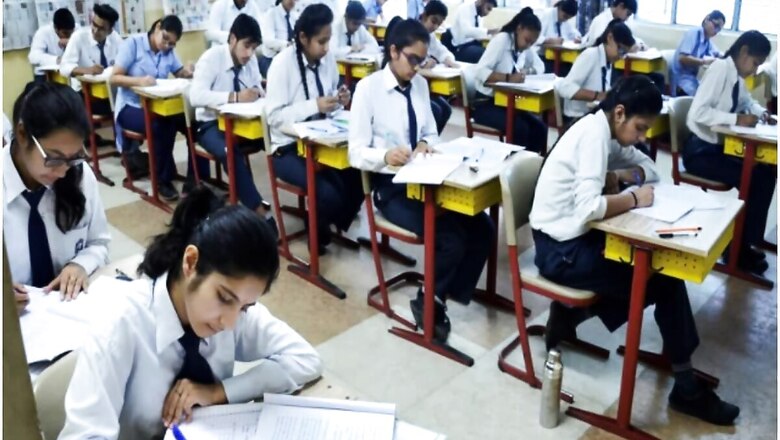
views
It required none other than the Prime Minister’s intervention to put an end to the steely resolve of the Central Board of Secondary Education (CBSE) to hold Class XII board exams this year. Other state boards are likely to follow suit. Prior to this, 32 states and UTs had supported conducting them despite the COVID-19 pandemic. There is not a single country, institution, community or person which has not been hit by the pandemic, but perhaps the annual ritual of Indian board exams which has not only stood its ground but become a topic of national debate. What is it about board exams, particularly of Class XII, that even the threat to children’s lives was not enough to cancel them and the Prime Minister had to set-up a high-powered committee headed by the Defence Minister to look into the safe conduct of examinations.
This article endeavours to understand the reasons for the centrality of board exams in Indian school system; nature of this obsession, its implications on the meaning of learning and lives of children; alternatives to board exams and examining the possibility of realizing them.
Are Board Exams Fair and Neutral?
Board exams are externally conducted public examinations, conducted typically in classes 10 and 12. The latter carries relatively more significance than the former as it marks the end of a child’ schooling and determines their future trajectory, particularly their entrance into colleges. They are conducted under conditions of extreme secrecy and confidentiality, where students are under constant vigil. More importantly, since students’ answer scripts are assessed by teachers who have neither taught nor known them, they’re considered to be fair, neutral and objective indicator of a student’s merit. It’s another matter that students appearing for board exams across the country come from varying home and school backgrounds and yet are measured by the same yardstick. This means that a rickshaw puller’s son studying in a municipal school and a Professor’s son studying in a fancy private school are treated absolutely alike so far as exam results are concerned. Nothing could be more absurd than this, yet this paradox remains hidden in the guise of neutrality. In fact, most people including school administrators, teachers, parents and children, etc. have enormous faith in the legitimacy and fairness of these exams.
While students may crib about the pressure board exams put on them or the nature of questions asked or the skewed emphasis on a one-off exam determining their future, they rarely ever question its validity in distributing or withholding awards. In a situation where number of aspirants far exceeds the rewards, board exams work well as they systematically eliminate students from the competitive race by glossing over structural constraints at home and school environment and shifting the onus on them alone. In a society, which is deeply stratified such as ours, exams convey to us that we get what we deserve wherein reasons for failure are attributed to one’s personal motivation and individual effort and rarely to the system.
This system of standardized and anonymous public exams was instituted by the colonial administration. This served two purposes—to position their rule as being fair and neutral by treating everyone equally, and two, by screening students’ basic knowledge and skills taught through a standardized curriculum for middle-lower level government jobs. Both the curriculum and medium of instruction was alien from the Indian students’ lives. These features of the school system—gap between child’s world and the world of school, restricted meaning of pedagogy and assessment which tested students’ ability in an objective and narrow manner, were retained even after India gained Independence. This is because the conditions favouring the importance of an exam like this—the mismatch between the number of aspirants and employment opportunities or seats in higher education—remained the same.
Do Children Engage with Learning?
Since the stakes are high, competition stiff and opportunities limited, board exams create pressure on children, parents and teachers. It must be understood that the focus in these exams is to master the techniques to crack them and not necessarily engage with learning. It must also be noted that concerns regarding these exams have been raised earlier as well.
More recently, the National Curriculum Framework in 2005 made a bold attempt to go beyond textbooks, memorizing etc. and rethink the meaning of education as well as reconsider the nature and purpose of assessments. The Right to Education (RTE) 2009 mandated no board exams till classes VIII, and instead proposed a school-based Continuous and Comprehensive Evaluation (CCE) of students and proposed non-detention of students even on failure in exams till elementary stage. However, a large section of the society ranging from politicians, school administrators, teachers to parents were not very pleased with this provision and eventually the RTE was amended. Board exams came back with a bang and non-detention policy was abandoned.
Exams, especially board exams, continued to flourish and shape learning as memorizing textbook content, designing textbooks so as to contain information, dictating teachers to elucidate content and telling students to memorize content, with or without comprehension.
Cancelling Exams a Stop-gap Measure
So, can one think of alternative and meaningful forms of assessment? Yes, but one needs to be cognizant of two factors—first, curricular, pedagogic and assessment-related processes are integrally linked to each other and, therefore, change in any one must be followed by a change in others as well. So far, assessment has been treated in isolation with a focus on mechanics of testing. Second, an unequal and stratified society will make inroads in formal schooling systems as well and use assessment results to explain and justify inequality. A country like India needs external examination to filter students and its no rocket science to gauge that these students come from disadvantaged backgrounds.
To what extent can teachers and good teacher education programmes make a difference to school education and culture of teaching and assessments? They can, perhaps, to a small extent in their own classrooms, but if board exams are tied closely to the prescribed textbooks used in schools; board results continue to enjoy the status they do in allotting rewards to students and are also indicative of teachers’ efficiency, competence and determine schools ranking, well-trained teachers will also not be able to impact such a complex system.
Cancelling the board exams is simply a stop-gap measure forced by the pandemic this year but we seriously need to re-think what is happening to our children in schools in the name of education and the kind of society such children will envisage and live in.
Read all the Latest News, Breaking News and Coronavirus News here.













Comments
0 comment